|
11/20/2012 Spiritualizing thought and life
I was surprised that our balloon had no sandbags attached to the side. I later learned that it is gas balloons, not hot air balloons, that use sandbags. And the removal of even a little bit of sand allows the balloon to rise. I think the relation of sandbags to gas balloons provides a good metaphor for spiritual growth. Every handful of earth-weight (a material sense of persons and things) that we let go of, allows us to go higher and to experience true being as God knows it - resulting in steady ascension. One of Mary Baker Eddy's pupils who was an editor of the Christian Science Journal, Annie Knott, once wrote:
Well dear one, you have no cause to doubt God's love for you and your child. And if He loves you He doeth all things that is (sic) for your good. But He does not destroy the work of His hands. You alone and all mortals are responsible for mortal conditions. They make them and they yield them up. Why do they give up what is so dear to them? Because they know not yet how to retain them as reality. (From a letter to Annie Knott sent by her teacher, Mary Baker Eddy, on June 16, 1896. Knott typed a duplicate to the letter, to which she added and initialed the comment: "This I value more than any other. A.M.K." The Mary Baker Eddy Collection, L04744): I hope you enjoy this blog. And if you do, I doubly hope you will share it!
If having a full-text version delivered to your email inbox would interest you, you can find the subscription box in the sidebar. You may also wish to: VISIT MY WEBSITE HOME PAGE FIND LINKS TO MY OTHER PUBLISHED CONTENT 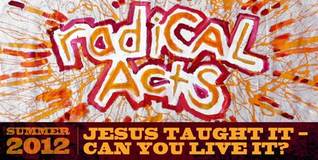 Most Christians will say that the Sermon on the Mount is among their favorite Scriptures, but how many of us actually practice what it preaches? Taken verse by verse, the Sermon on the Mount contains some of Christ Jesus' strictest (read: toughest) teachings. For example, he says, "And if anyone wants to sue you and take your shirt, hand over your coat as well. If anyone forces you to go one mile, go with them two miles. Give to the one who asks you, and do not turn away from the one who wants to borrow from you." Matthew 5:40-42 I think Jesus asks something pretty extraordinary. He asks that we practice a Christianity where our personal losses can be a gain. It is a charity – a level of love that puts the needs of others above our own. Give, love, share, think of others. Do more than they ask, give more than they think they need or want. He says we need to do this. To enjoy giving to others. No self-justification, no feelings of injustice. No ME ME ME in our prayers and giving and doing. Sound hard? The Sermon on the Mount does raise the bar very high. These lessons aren’t always easy to hear. They certainly aren’t always easy to practice. But how much do we want to be able to heal? How much do we really want to change the world? To be a blessing to others? 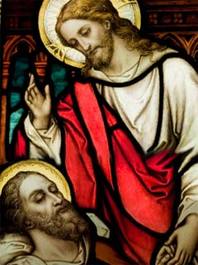 A man once told Jesus that he had followed the Ten Commandments since a child, but he wanted to know what more he needed to do to obtain eternal life. Matthew says, "Jesus said unto him, If thou wilt be perfect, go and sell that thou hast, and give to the poor, and thou shalt have treasure in heaven: and come and follow me. But when the young man heard that saying, he went away sorrowful: for he had great possessions.” Matthew 19:21-22 His problem was not too much stuff. His problem was too much love for his stuff. More love for his stuff than for his own life. Think about it. Releasing materiality he would gain eternal life. Doesn't that sort of indicate that holding onto materiality is certain death? Like a death to freedom, death to joy, death to spiritual progress, death to stress-free, unburdened life? Materiality - the ME ME ME, MINE MINE MINE - has got to go if we want to progress. One day when I was 18, I read in Mary Baker Eddy's Science and Health with Key to the Scriptures, “A great sacrifice of material things must precede this advanced spiritual understanding.” I thought, “But I want to get married! I want a house, a nice car, a good life!” Then, I realized that this was a demand was for a sacrifice of material things - that which could be destroyed, that isn’t fixed or permanent. I realized that I would always have in my life whatever expressed the bounty of God and that supported my practice of prayer and healing – that which is permanent and spiritual.  I remembered this each time I bought a house or car, or even with each marriage. I would ask myself, "Is this just another thing I want? Or does this house or relationship support my spirituality and give me opportunities to serve God and to express good?" If I could answer yes to the second question, I knew there was no risk of loss. Change and progress, yes. But loss, no. In fact, husbands, wives, homes, bank accounts, transportation can be an expression of God's provision and care. We can put the arms of prayer around all the elements of good that supports spiritual progress in our lives. But stockpiling material things for one's personal, exclusive benefit is a deadly form of materialism. One of the "Radical Acts" challenges on Time4thinkers.com is: Sell what you have and give to the poor. One commenter who is striving to put this challenge into practice wrote, "I realized that it wasn’t enough to just sell the stuff that I don’t really care about anymore. But that I needed to sell those things that I still feel have value and worth." Thanks for that, Kate. I thought of my basement packed to the ceiling with boxes of the last treasures I didn't want to part with after our move - things of value, things I still love. Inspiration blew through me like a cool summer breeze. "Let it all go. Give it all to others who need it." So I have started distributing. My goal this summer is to empty the basement of everything except the Christmas decor. Whoa. This is big. And it feels just right. 6/18/2012 I will love, if another hates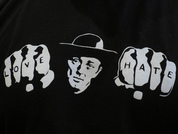 "I will love, if another hates. I will gain a balance on the side of good, my true being. This alone gives me the forces of God wherewith to overcome all error." (Miscellaneous Writings 1883-1896, 104) These immortal words of Mary Baker Eddy rang through to my thought yesterday as I heard a powerful story recounted by Ulrike Prinz, CS, of Hamburg, Germany, in her lecture entitled "A Christian Science Response to Hate and Violence." I was very moved by what I heard, and I am grateful to have found the source of the story on the internet. At the bottom of this post, you will find hyperlinks to the original book and biographical info on the co-authors. 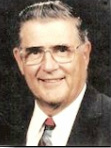 George Ritchie, PhD "When the war in Europe ended in May 1945, the 123rd Evac entered Germany with the occupying troops. I was part of a group assigned to a concentration camp near Wuppertal, charged with getting medical help to the newly liberated prisoners, many of them Jews from Holland, France, and eastern Europe. This was the most shattering experience I had yet had; I had been exposed many times by then to sudden death and injury, but to see the effects of slow starvation, to walk through those barracks where thousands of men had died a little bit at a time over a period of years, was a new kind of horror. For many it was an irreversible process: we lost scores each day in spite of all the medicine and food we could rush to them. "Now I needed my new insight indeed. When the ugliness became too great to handle I did what I had learned to do. I went from one end to the other of that barbed wire enclosure looking into men's faces until I saw looking back at me the face of Christ. "And that's how I came to know Wild Bill Cody. That wasn't his real name. His real name was seven unpronounceable syllables in Polish, but he had long drooping handlebar mustaches like pictures of the old western hero, so the American soldiers called him Wild Bill. He was one of the inmates of the concentration camp, but obviously he hadn't been there long: his posture was erect, his eyes bright, his energy indefatigable. Since he was fluent in English, French, German and Russian, as well as Polish, he became a kind of unofficial camp translator. 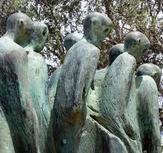 "We came to him with all sorts of problems; the paper work alone was staggering in attempting to relocate people whose families, even whole hometowns, might have disappeared. But though Wild Bill worked fifteen and sixteen hours a day, he showed no signs of weariness. While the rest of us were drooping with fatigue, he seemed to gain strength. "We have time for this old fellow," he'd say."He's been waiting to see us all day." His compassion for his fellow-prisoners glowed on his face, and it was to this glow that I came when my own spirits were low. "So I was astonished to learn when Wild Bill's own papers came before us one day, that he had been in Wuppertal since 1939! For six years he had lived on the same starvation diet, slept in the same airless and disease-ridden barracks as everyone else, but without the least physical or mental deterioration. "Perhaps even more amazing, every group in the camp looked to him as a friend. He was the one to whom quarrels between inmates were brought for arbitration. Only after I'd been at Wuppertal a number of weeks did I realize what a rarity this was in a compound where the different nationalities of prisoners hated each other almost as much as they did the Germans.  As for the Germans, feelings against them ran so high that in some of the camps liberated earlier, former prisoners had seized guns, run into the nearest village and simply shot the first Germans they saw. Part of our instructions were to prevent this kind of thing and again Wild Bill was our greatest asset, reasoning with the different groups, counseling forgiveness. "It's not easy for some of them to forgive," I commented to him one day as we sat over mugs of tea in the proceeding center. "So many of them have lost members of their families." "Wild Bill leaned back on the upright chair and sipped at his drink. "We lived in the Jewish section of Warsaw," he began slowly, the first words I had heard him speak about himself. 'My wife, our two daughters, and our three little boys. When the Germans reached our street they lined everyone against a wall and opened up with machine guns. I begged to be allowed to die with my family, but because I spoke German they put me in a work group." "He paused, perhaps seeing again his wife and children. 'I had to decide right then,' he continued, 'whether to let myself hate the soldiers who had done this. It was an easy decision, really. I was a lawyer. In my practice I had seen too often what hate could do to people's minds and bodies. Hate had just killed the six people who mattered most to me in the world. I decided then that I would spend the rest of my life, whether it was a few days or many years, loving every person I came in contact with.'" (An excerpt from the book "Return from Tomorrow" by George G. Ritchie with Elizabeth Sherrill, published by Fleming H. Revell, A division of Baker Book House, Grand Rapids, MI., pgs. 113-116) Thank you, Ulrike Prinz, for bringing this story out for your audience in Paris. Love it? Please share it. Let's work together to share the love.
Your shares reach and bless many, many others. If you aren't yet a subscriber, a full-text version of the blog can be delivered to your email inbox. It's easy to sign up in the sidebar. You may also wish to: VISIT MY WEBSITE HOME PAGE READ MORE BLOG POSTS FIND A LIST OF MY OTHER PUBLISHED CONTENT  Our daughter, Susan, decided to come for a visit and help with some chores. It was a wonderful. Most touching was getting the Christmas tree in and up! We decorated it with lots of lights. Since 9/11 we have decorated only with lights as a way to remember to pray for those whose lives were changed on that day. However, when I came across a box of old decorations, we had a great time looking at them and remembering past Christmases. We felt it was time to add them to the lights, so this year we did. When I pulled out a little angel from the box, Susan got all excited. “You put the date on this one and it’s my birth date! I was just 6 months old that Christmas!” Even though the little angel had lost its shine and its left wing was broken, there was just one place for it - the place of honor at the top of the tree. |

Find me on YouTube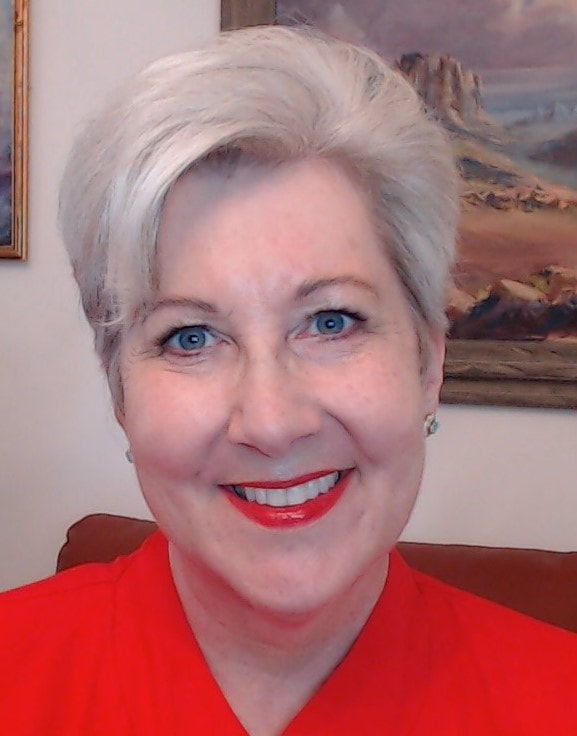
I have practiced Christian Science professionally in some form since 1979. But my journey with Christian Science started in a Sunday school where as a young child I was taught the Scriptures and some simple basics of Jesus' method of scientific Christian healing. A significant experience at the age of twelve opened my eyes to the great potential of this practice. After impaling my foot on a nail, I prayed the way I had learned in Sunday school. Within moments the pain stopped and healing began. By the next morning the wound had disappeared completely. Having experienced the great potential of Christian Science, there would be no turning back. |
INFORMATION |
SERVICES |
HELP |
© 2011-2024 Michelle Boccanfuso Nanouche, CSB. All rights reserved. Pages updated February 6, 2024.

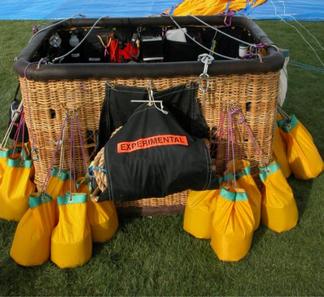
 RSS Feed
RSS Feed
